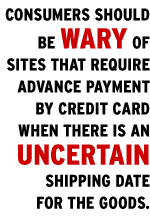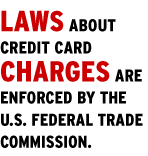| |||||||||

Giveaway site makes waves with credit charges
 A Web site that provides free merchandise to customers after a shipping fee is charged to their credit cards has raised consumer concerns that broadly affect other e-commerce sites. A Web site that provides free merchandise to customers after a shipping fee is charged to their credit cards has raised consumer concerns that broadly affect other e-commerce sites. Sails4free.com gives away sails or canvas covers for boats, charging customers about $30 for shipping and handling. The sails bear the logo of an advertiser, which theoretically pays for the product's cost. Several customers, however, report that they were charged immediately, but said their sails didn't arrive for months and their attempts to contact the company went unanswered. A number of customers said they never did receive the sails. And, shipping delays or not, officials say charging a credit card before an e-commerce product is actually sent may not be proper. Sails4free vice president Andrew Heffner said hundreds of sails had been sent to satisfied customers since April, when the Internet site was founded. However, it can take several months to match an advertiser with customers in a given geographic area, he said. "You're getting a $600 sail for $30," Heffner said. "What you do is fill out an application, and an advertiser has to approve that application." The application form states that applicants should "allow a minimum of eight weeks" for delivery and that "payment must be received prior to shipment."
Posting such notices, however, may not give an e-commerce site the right to process credit card charges before a product actually ships. Visa International regulations state that a cardholder "must not be billed until the goods are shipped by the Internet merchant," according to Casey Watson, director of global corporate relations for Visa International. "That obviously applies to all Internet merchants in the world," Watson said. Credit card regulations for Internet sites are very specific to give consumers the same sense of safety when shopping in cyberspace as they might have in brick-and-mortar stores, Watson said. In addition, laws about credit card charges are enforced by the U.S. Federal Trade Commission. Elaine Kolish, associate director of the FTC's Bureau of Consumer Protection, says the agency's Mail or Telephone Order Rule generally applies to Internet transactions as well as more traditional catalog sales. The rule requires shipment within 30 days of an order unless some other specific date is "clear and conspicuous." Fines up to $11,000 per violation can be imposed. Neither Watson nor Kolish would express an opinion about Sails4free, since each situation is unique. Sails4free's Heffner says the company has "a couple of hundred" orders that haven't yet been shipped. Asked how many of these customers' credit cards had already been charged, Heffner said, "Probably the vast majority of them, waiting for an advertiser to approve them." Nothing suggests that Sails4free is anything other than a small business with more applicants than advertisers. Heffner said the company will refund unhappy customers' money. And after a reporter's inquiries, the Sails4free site added a line stating, "Due to overwhelming demand, we will not be accepting orders until further notice." But cautious consumers should be wary of Web sites that require advance payment by credit card when there's an uncertain shipping date for the goods.
A Wired Watchdog update Cogit chief executive Peter Corrao said Thursday the company laid off 30 employees, or approximately half of the work force, about five weeks ago. Consumer advocate Brian Livingston appears at CNET News.com every Friday. Do you know of a problem affecting consumers? Send info to tips@BrianLivingston.com. He'll send you a book of high-tech secrets free if you're the first to submit a tip he prints. who's speaking? |
|
|||||||||||||||||||||||
|
Send us news tips | Contact Us | Corrections | Privacy Policy |
|

